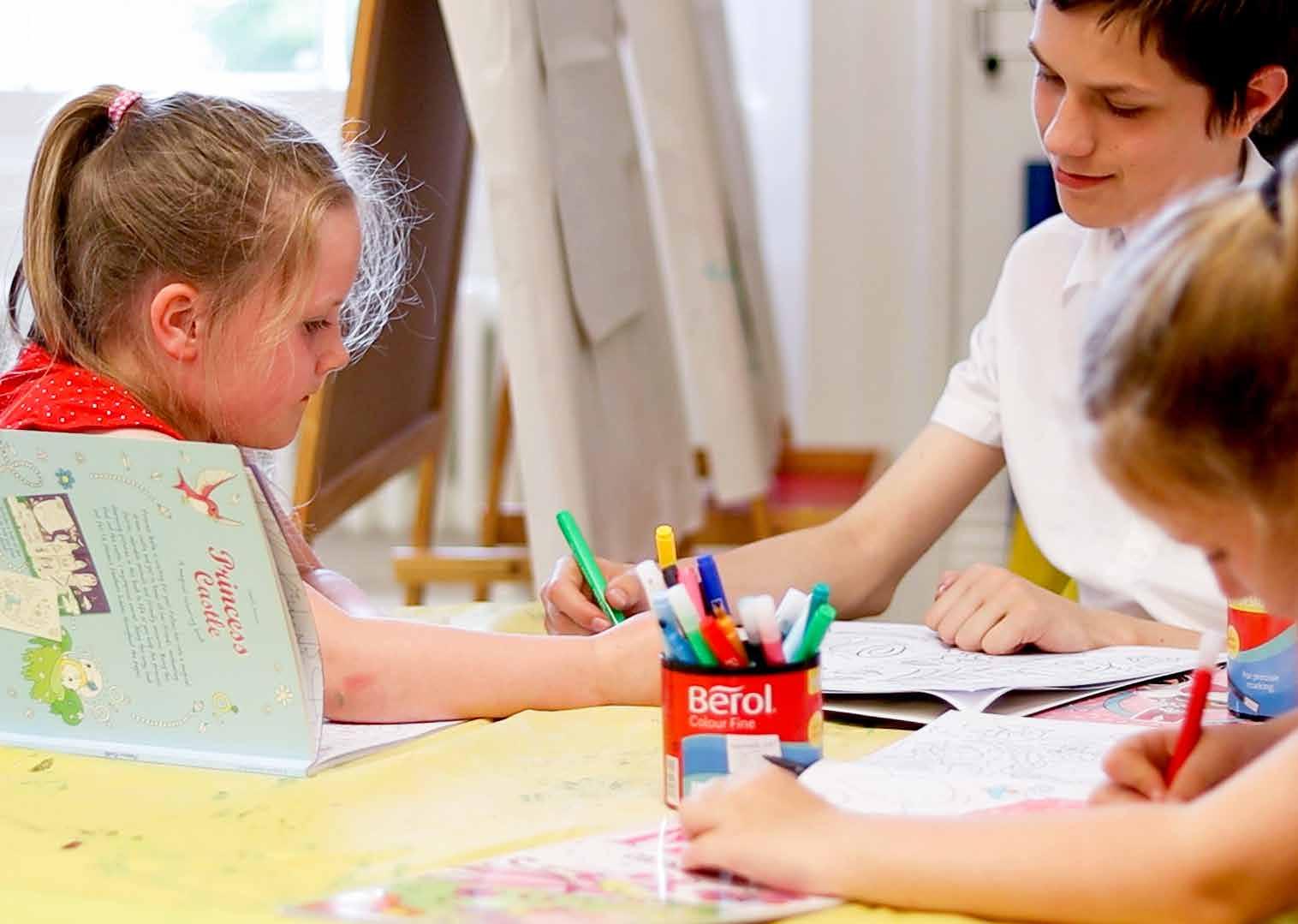














Families come in many different shapes, sizes and structures. Many families transform and evolve too! All families are unique.
Think of the famous families you've read about in books. Some families are big like the Bucket family in Roald Dahl's Charlie and the Chocolate Factory. There are Charlie's parents, his four grandparents and Charlie himself. Some families are small and changing like Heidi's family in Johanna Spyri's Heidi, where the main character is raised by her aunt and nana then grandpa.

Kinship care is care provided to a child by a family relative instead of birth parents. A kinship carer can be a grandparent, aunt, uncle, sibling or cousin.
Kinship care can be an informal arrangement between the carer and the parent. Sometimes, it can also be through a legal order. In the UK, examples of these legal orders include the Child Arrangements Order (CAO
In the UK, there are more children in kinship care than any other placement option for children whose parents are unable to care for them. According to the 2011 census, 180,040 children were estimated to be living under kinship care in the UK.

Due to the absence of state regulation before the early 20th century, the practice of kinship care has not been documented very well in British history until fairly recently. However, one thing is for sure, kinship care has been around for as long as people have been having children – long before there was any state process!
Children enter kinship care for a myriad of different reasons. Every family's circumstances are unique, so it is very important to be sensitive and not make assumptions or jump to conclusions quickly about someone who is in kinship care. The reasons for kinship care also vary throughout history.
abuse abandonment alcoholism bereavement better family bonding domestic violence education financial reasons health reasons imprisonment migration neglect resource sharing substance abuse work constraints war The list goes on and on...



In the past, kinship care was relatively more commonplace than now. Usually, the arrangement would be made when parents were unable to care for a child. This could be due to parental illness, death or poverty. Compared to now, medical treatments in the past were far more limited. This resulted in higher mortality rates and a greater need for orphaned children to be cared for. Additionally, families back then were much larger while state help was scarce. Children would therefore often be sent to their grandparents or aunt and uncle who could share the cost of childcare and provide them with one-to-one attention.
Historically, some parents would also send their children to their kin if they believed their children might gain access to better healthcare, education or opportunities in life. For parents who had to travel and work away from home, leaving their children with relatives could have been their only practical option, as travel and communication were way more costly and difficult in the past.
Generally speaking, kinship care used to be seen by British society as something natural, normal and expected. It was a safety net for parents when there were barriers to raising their own children. It also aligned with familial values in the past which emphasised the importance of blood connections and family helping each other out.
Times have changed, and so have the types of reasons why some children are unable to live with their birth parents. While kinship care still takes place because of parental death, ill health and financial problems, more common causes in modern times are parental drug or alcohol misuse, neglect and domestic violence. In present-day England, when authorities decide that there is a need to remove a child from the care of their birth parents and consider a new carer for the child, preference is given to kinship carers, provided they can safeguard the child and meet their welfare needs.

Challenges are faced by both kinship carers and children in kinship care. These challenges vary from family to family.
We live in a society where biological parent-child relationships are often idealised. Since kinship care is not as prevalent as it was, not many people talk about it or see it as normal. Without enough awareness and understanding of kinship care, kinship families are sometimes not provided with enough help and empathy that is needed.
In many cases, challenges faced by kinship families may not be immediately obvious, and many are of a very personal nature.
Raising a child is a physically demanding duty especially for grandparents or elder relatives who become kinship carers at an older age.
Kinship carers may experience insensitive actions and judgements from members of the public who perceive kinship families as 'failed' or 'problematic' families. They often have to explain their circumstances repeatedly at school or when using public service with the children they look after. The uncertainties arising from kinship care may also lead to a great deal of stress.
Kinship carers in the UK have limited access to financial support from government authorities. For example, kinship carers are not offered an allowance in the same way as foster carers are. They also have no equivalent to maternity leave or adoption leave to help them settle any new children moving in.
Family conflicts and strained relationships Some parents may not take it well when a relative replaces them as their children's legal caregiver. Kinship carers may also feel resentful of their adult child or family member whom they may feel have disrupted their lives and put them in a difficult position.

Children in kinship care may feel isolated when they do not know anyone else who are also in their situation. They may find it difficult to fit in with their peers, and feel left out of school activities which involve or revolve around the presence of parents.
Many children in kinship care have suffered traumas and experienced early loss of a parental figure. Without adequate specialist support, these negative experiences may greatly affect kinship children's emotional, social and behavioural wellbeing.
Despite the challenges of kinship care, kinship families are just like any other family, in that they all have the potential to thrive with love, care and support. Like all of us, kinship carers and children too have ups and downs in life, but as you can see from the video below, they can still find the rewards that a loving family gives.





Which of these fictional characters have been in kinship care?

When you're young you never think about how a child changes your life. As a young adult, you're in a stage of your life where you can explore your independence, have fun and see all that life has to offer. After a while you may make a decision that you would like to start a family, many of us do. There are challenges that you expect and those that you don't in looking after a child. There were so many sleepless nights and so many happy days. I lost a bit of my independence, I now had a responsibility greater than myself. But in losing this I gained something far greater that comes from starting a family, something that can hardly be put into words.
I was young when I had my first children. I had lots of energy and so much love to give. My partner and I ran and we played with them. We wanted to give them the time growing up that every child deserves.
The time came eventually that my children grew up and flew the coop. They were getting older and so were we. Soon they wanted their own little freedoms, the kind that I couldn't give them at home. So they left. It wasn't sad, I hadn't lost them, not exactly. Our relationship had just changed and that's something every parent has to expect. It was bittersweet and that's okay. I was proud that they were forging their own path, and in time I adjusted to a quieter house. Suddenly, I'd found myself with that independence I'd known so long ago.
I started to grow older and I became more aware of my body. I wasn't as fast as I used to be, but I kept walking on and on, because that's what you do.

My first grandchild came along and they were the light of my life. A happy, beaming child gurgling and babbling. What a wonderful little thing they'd brought into the world. To say it was love at first sight wouldn't do it justice.
For a while things were fine, and for a while after they were difficult. Life has its many challenges.

I was called to court one day, and when I walked out of that court I had gained a new responsibility, a new life to look after as a protector and caregiver. I had never expected to return to this part of my life, certainly never full-time. I had expected to be nana, to keep them on the weekends or after school.
I had a lot of learning, unlearning as well as changing to do. Caregiving never becomes easier, each child is unique and comes with unique needs. These were some of the things I needed to learn.
As they grew older I took them to the park to play, as I had so many years before. I couldn't run quite as fast or play for quite as long, but I still did it. I did it for them. I could see how happy they were after what they had been through. They could tell they had someone who loved them and that is what powers me to continue on and on.

I took care of my child when he was very young. He was barely old enough to understand what was happening outside of himself, so when I brought him home he was completely unfazed.
He still got to see his mum – some children don't in his position, but he did. I'm happy that she wasn't completely removed from his life, because he still had those early memories of her. Perhaps he had an inkling of an idea why he didn't live with her?

As he grew older, we started to notice that he had some additional challenges. This was nothing unexpected, there are many kids like him. I realised, though, that he was more emotional than the children I had brought up before. I didn't know at first what to do, but I learned in time how to make sure his special needs were met.
He started asking questions when he grew up. The other children had surely noticed that 'nana' was picking him up from school and not 'mam'. 'That's just how our family is.' I'd tell him. It was enough of an answer to satisfy him.

He doesn't understand the reason why he lives with me, and I don't think he's ready to know just yet. He's in a time in his life when it's important to feel part of a group and I don't want to take this away from him. I'd say he's not ready to know, but perhaps I'm not yet ready to face that challenge either. I don't do this out of fear, or out of concern for the repercussions. I do this so that he can have the childhood he deserves. I want him to be happy. That will always be my goal.

Some of them wake us up for breakfast everyday
Pick us up from school, take us swimming at the pool
Shower us with love for all our days





Not all families look the same

But they’re the ones that look after us each and every day

Hug us when we need it, cook us food when we need feeding
Make us laugh for hours when we play


The 'Kinship Kids' song project was produced by We Make Culture in collaboration with More Than Grandparents. It was suggested by the families, who wanted to write a song which reflected their experiences of kinship care, which is often misunderstood or misrepresented. The participating Families worked with musicians Paige Temperley and Ashleigh Lowes and animator Josie Brookes to co-create this final music video.
Scan the QR code to watch the music video!

Based in Sunderland, We Make Culture CIC is a social enterprise using music-making to affect social change. They are long-term partners with More Than Grandparents, working together over a number of years to support kinship children to access music and other cultural activities.
Kinship Kids was produced by We Make Culture CIC, using funds from National Lottery Community Fund.

https://www.careexperienceandculture.com/
https://www.careexperiencedhistorymonth.org/
Child Law Advice
https://childlawadvice.org.uk/information-pages/family-and-friends-care/
Family Rights Group
https://frg.org.uk/get-help-and-advice/who/kinship-carers/
Kinship
https://kinship.org.uk/
https://www.morethangrandparents.com/

Is there anything you find interesting or surprising about kinship care? Are there any questions you'd like to ask? Drop us a line at kinshipcarenotebook@gmail.com and tell us all about it!
Supported by the National Lottery Heritage Fund, this book project has been made possible thanks to the combined efforts of the wonderful kinship carers and children at



More Than Grandparents; Christie Chan and Rory Williams of Art Matters Now; and social historian Dr Kate Gibson of the University of Manchester, whose research is funded by the Leverhulme Trust. Project
Learn more about this project at: www.morethangrandparents.com www.artmattersnow.org.uk youtube.com/@kinshipcarenotebook

The Kinship Care Notebook is designed to celebrate the diversity of families in society and raise awareness of kinship care. It answers questions that you might have about kinship care and its history, while offering the points of view of real-life kinship families and children in the North East of England.
 Copyright © 2023 Art Matters Now. All rights reserved.
Copyright © 2023 Art Matters Now. All rights reserved.